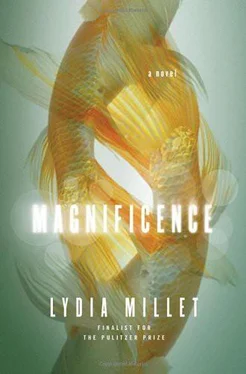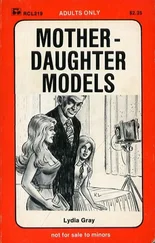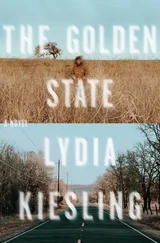In the morning she went into the bright kitchen happy because Jim had been kind to her, Jim understood that she had killed and though maybe forgive wasn’t the word, he saw and didn’t give up on her. She came down in a good mood and found them seated around the table, four ladies in nightdresses with gleaming fish overhead, eating toast with marmalade and listening to some kind of quaint homily about daily life: National Public Radio. Angela had made breakfast for them, even brewed them a carafe of her weak, stale coffee from a can, which she preferred to Susan’s gourmet beans.
Angela was animated, rising to get them fresh toast as it popped up in the toaster, and Susan saw she had been changed by their presence: the older ones made her energetic, gave her a central role, bustling around. But surely she couldn’t sustain it, Susan thought, she’d have to absent herself again or even perform a broadly insane act, such as stripping naked or locking herself in a room. Then the ladies would quietly take their leave.
Jim had gone off to the office so it was only Susan and the ladies; her kitchen felt crowded. She spooned up some yogurt, drank a half-cup of the weak coffee and then went outside and crossed quickly to the shed in the backyard, where she chose a shovel from the dirt-encrusted fleet of them propped up against a shelf. Backhoe, she thought, wasn’t that overkill anyway? She could find out what was beneath the manhole without the help of large earth-moving machines. Of course she could.
On the shelf beside the shovels she found an old, dusty gray pair of gloves, shook them in case there were spiders or splinters in the finger holes and then pulled them on. Last time she’d tried to wield a shovel she’d rubbed blisters on her palms and torn them open. A kind of water had flowed out when they ripped: was that pus? But it had been light — transparent, inoffensive.
We know so little of our molecules, she thought, the molecules we are. . so little about them. A proof they’re in control: they guide our hands, they make us grow, they form our children inside our bodies — miracles come from them, all that has ever been, all that will be. Meanwhile our conscious selves perform their rudimentary acts, those simple sums. What shall I be, whom shall I love: those are the easy parts, behaviors that we call ourselves, they’re only icing, floral borders, all that we think we are is trivial while what we really are is not even known to us. If there is a machine, a ghost in the machine — they always said the machine was the body, didn’t they? Philosophers? — but no! The body’s both of them, machine and ghost. The body’s not only the vessel but also its spirit, the body is visible but its animators impossible to see. Materialism, she thought, sure — she might be a proponent. But she didn’t like the flatness of answers, the stolid and dull arithmetic of being, not at all! Rather the glory of the unseen. She believed in the ineffable, great mystery, great creation, only that it was lodged in molecules, in molecules, beyond the human ability to see.
The final authority of the microscopic.
She carried the shovel into the back, through the trees, stuck its blade into the ground a few inches from the manhole and then stood on it with one foot. She hopped awkwardly to sink it further, then dismounted, scooped and flung. And again. It was hard, boring work and soon she was dizzy and distracted. As the minutes passed she felt blisters starting on her hands again despite the gloves, felt dirt down the backs of her sneakers and in between her toes, and just as she was thinking how tedious it was the spade hit underground metal.
“Well of course,” said someone, and she looked up to see the elderly dominatrix, now clad not in the red and gold ensemble of yesteryear or her ruffled nightgown from the breakfast hour but in a voluminous dress of deep and vibrant purple. Around her neck hung a crescent-moon pendant in silver, vaguely redolent of Wicca or perhaps the New Age.
Were there obese Wiccans?
“Of course what?” asked Susan, out of breath.
“You’ve hit the shaft.”
“I didn’t know there’d be one,” said Susan. She stood resting, catching her breath. What a stupid idea, digging. Of course some Wiccans were obese. Sure — even morbidly so. No different from other Americans, most likely. One of Casey’s best friends in high school had been Wiccan. She worshiped the moon goddess, the feminine principle, and told Casey not to use tampons. She advised Casey only to use sea sponges when she had her period. The use of tampons was a denial of the sacred nature of womanhood. The tampons were the patriarchy. Sponges by contrast came from the ocean, which some viewed as feminine. And also by contrast with the tampons, manufactured by companies that men owned and designed to men’s specifications, the sponges were not shaped like penises or missiles.
But with sponges you had to wash the blood off in the sink.
Susan had run interference. She spoke of practical benefits. After the accident Casey lost touch with the Wiccan friend, who went to college and presently joined the Young Republicans.
Susan squinted at the purple-clad woman and tried to imagine her dancing at midnight before an altar to the horned god.
“You think it goes deep?” she asked.
“Too deep to tackle with that thing. Don’t make me laugh. It’s probably solid iron. You could be talking twenty feet deep.”
“I’m sorry,” said Susan. They’d never been properly introduced. “I’m not sure I even know your name! I’m Susan, Susan Lindley.”
She stepped forward and stuck out a gloved hand, which the large woman took and pressed lightly. She wasn’t without grace, Susan thought. Around her own mother’s age, if her mother were still alive — older than Angela by almost a generation but clearly far more coherent.
“Portia,” she said.
“Porsche?”
“No, not the sportscar,” said the woman haughtily. “The moon of Uranus, for instance, discovered by Voyager 2 . I myself predate the Voyager s by several decades, needless to say. I was, like the moon, named after the heroine of The Merchant of Venice, if you knew your Shakespeare. All of the Uranus moons are named after characters in Shakespeare. And Pope, of course.”
“I don’t know my Shakespeare or my planetary trivia,” said Susan. “How many Uranus moons are there?”
“Perhaps you recognize this line: ‘The quality of mercy is not strain’d. It droppeth as the gentle rain from heaven, upon the place beneath.’ Sound familiar?”
“It does. The gentle rain part. Definitely.”
“That line’s Portia’s.”
“I’m glad to meet you, Portia.”
“About the moon,” went on Portia, lifting the too-large necklace off her chest, “little is known.”
“I see.”
“And to answer your question: there are twenty-seven.”
“Many moons.”
They were gazing at each other. Susan realized she tended to like the woman, found a kind of reassurance in the woman’s pompous presence.
“Any hoo ,” said Portia. “What you need here is simple: a backhoe.”
“I’m not sure I know where to get one,” said Susan. “I did find a guy with a jackhammer. But a backhoe, that’s a whole other level.”
Hal had ridiculed people who used that turn of phrase. A whole other level. A whole ’nother level. Both, according to Hal, were not only annoying but also ignorant. His least favorite common phrase had been Can I help who’s next? But Susan had stubbornly used the language he looked down upon. She saw his point, certainly, but she couldn’t get behind the snobbery.
Like Hal, this woman seemed the type to value correct speech.
Читать дальше












